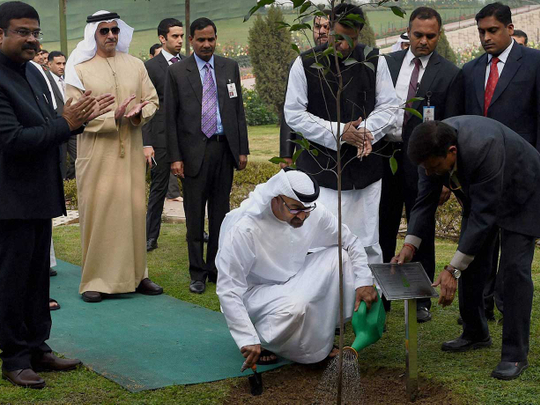
There are many gains that were realised in the recent trip to India by His Highness Shaikh Mohammad Bin Zayed Al Nahyan, Crown Prince of Abu Dhabi and Deputy Supreme Commander of the UAE Armed Forces, between February 10 and 12. The most emblematic event was the watering of the plant of friendship between UAE and India, which has been a symbolic one, overflowing with connotations. The fact that the plant carries the name of our great founder, the late Shaikh Zayed Bin Sultan Al Nahyan, and watered by his son, Shaikh Mohammad, is indeed enough.
In a country where rapid changes are taking place with the spirit of hope and perseverance, it is difficult to look at the visit from an economic dimension only, as the visit has many deeper meanings of documenting a relationship that is hundreds of years old. A relationship that began with trade — the first activity that linked people of the two countries due to their geographic locations.
There are vast signs of a great relationship between the UAE and India in the 20th century, the most prominent of which was probably Shaikh Zayed’s visit to India in 1975, which was a quantum leap in Arab-Indian relations following the planting of the friendship tree at the Raj Ghat near Mahatma Gandhi’s memorial. That was the first official visit to India by a UAE leader — one that established a relationship that has lasted up to this moment.
At the hands of Shaikh Zayed, the UAE experienced incidents that were associated with its own entrepreneurial experience in external relations, based on mutual respect. At the same time, internal policies of the UAE were based on a spirit of renewal and regeneration. In this regard, probably the most significant change is the recent introduction of new ministerial portfolios such as Minister of State for Happiness and Minister of State for Tolerance.
Today, Shaikh Mohammad’s visit comes as a continuation of what late Shaikh Zayed had started and it is set to merge with further experiences. The journey remains the same and the meaning is one: Zayed plants and Mohammad waters the plant of friendship. This is the UAE that continues to shine with development, tolerance and happiness.
It is with no doubt that Shaikh Mohammad’s visit has opened huge investment prospects to companies and Indian businessmen in the UAE, which will be beneficial for both parties. According to recent Dubai World Trade Center reports, the total Emirati investments in India extends up to almost $8 billion (Dh29.42 billion) and is expected to increase by 60 per cent after the current agreements from the visit in a timeline of five years.
Here is the true meaning of the visit: It seeks integration as a fundamental dimension of development and external relations where several agreements and MOU’s (Memorandum of Understanding) have been signed in various fields to raise the level of holistic strategic cooperation between the two nations. The agreements included investments in infrastructure, renewable energy, and cooperation in the health and space sectors. The agreements also intend to develop 30 basic fields — among them, security, combating terrorism and cybercrimes, promoting education, in addition to the establishment of a mutual fund to invest in infrastructure, specifically ports and railways.
Mutual recognition
The two sides exchanged a letter of intent between the National Qualifications Authority and the Ministry of Developmental Skills of India for future cooperation in skill development and mutual recognition of qualifications, transfer of skilled labour between India and the Gulf states, and to achieve the principles of equality and mutual benefits. In addition, an MOU was signed between the Ministry of Interior of the UAE and Ministry of Internal Affairs of India for cooperation in the technical field and in the fight against cybercrimes that threaten the security and stability of the interests and safety of communities.
The parties also agreed on a general framework between the Ministry of Foreign Affairs and International Cooperation and the Ministry of Renewable Energy in India with the focus on investments and research between the two countries. It is no exaggeration to say that Shaikh Mohammad’s visit to India is a deep imprint on the developmental expectations that will increase in the near future, with the effects being felt in the political, economic and humanitarian fields.
The UAE today is headed towards the future on a bridge between the strategic companies and achievements and this is the finest experience, as it concentrates on crucial future visions politically, economically and developmentally.
Kaltham Al Mandoos is the managing editor of Al Roeya newspaper.










